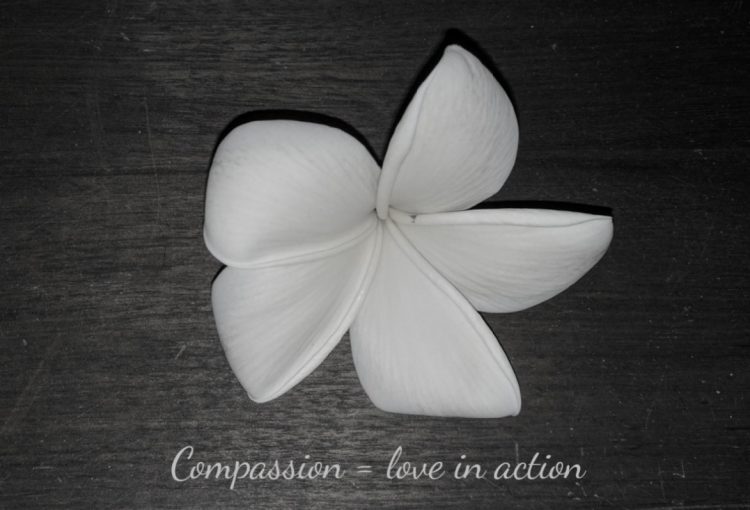Why These Words Aren't Interchangeable When Responding to a Friend's Illness
For as long as I can remember the words sympathy, empathy, pity and compassion have been tossed around and used interchangeably, as if they were one and the same. I would like the chance to prove that they are not.
Now, I won’t disagree that sympathy and pity can usually be lumped together, as they are both pretty passive in real life application.
In fact, here’s how one online dictionary defines sympathy: “a feeling of pity or sorrow for the distress of another.”
And its definition of pity is actually pretty similar:”sympathy or sorrow felt for the sufferings of another.”
But what does that translate to in real life? Simply put, sympathy is what polite society does at a funeral. Sympathy is sending a card at appropriate times. Sympathy summons up the obligatory, solemn and awkward smile because it doesn’t know what else to say or do. And pity? Pity shakes its head and sucks its teeth at catastrophe, while simultaneously not getting close enough to risk being pulled in.
Sympathy and pity can be expressed without taking us too far out of our comfort zone. Think back to a time when you said to a grieving person at a funeral, “I’m sorry for your loss. If you need anything, just call.” Did they call you? Exactly. What did expressing sympathy really require of you? And are sympathy and pity really the same as compassion and empathy?
The definition of empathy is: “the ability to relate to another person’s pain vicariously, as if one has experienced that pain themselves.”
When we look up compassion, here is what we find: “an understanding of another’s pain and the desire to somehow mitigate that pain.”
These words are very similar to each other, but they go so much deeper than sympathy or pity.
I’ve heard empathy described as “your pain in my heart,” and compassion as “love in action.” Empathy and compassion are active words. It’s almost like they can be personified. Empathy doesn’t just direct well-meaning clichés at another’s misfortune. It cries with them, feeling the pain just as deeply, whether it has actually experienced that pain or not.
Compassion doesn’t just shake it’s head in sadness upon hearing of tragedy. Knowing instinctively what needs to be done, compassion takes action. Compassion throws a rope down to someone stuck in a hole, or better still, it climbs in and carries them out. The capacity for empathy is what inspires compassion. And it’s why I feel that these two beautiful words belong in a class all their own.
Would you like to know what you can do with all this information? Can one put it to use in every day life?
First, let’s start with understanding what chronic illness is, and why empathy and compassion from those around us means so much.
A chronic illness is any disorder (physical, mental or emotional) that persists over a long period and affects physical, emotional, intellectual, vocational, social, or spiritual functioning. Chronic illnesses have no cure, and often chronic illnesses impact a person’s life in unexpected, unpredictable ways.
Here’s the useful, practical part.
If you have someone in your life who struggles with a chronic illness, be it physical, mental or emotional, take some time to allow yourself to feel their pain and struggle. Imagine yourself in their circumstances. This may be uncomfortable at first, but that’s kind of the point. Empathy takes you out of your comfort zone. So let yourself really go there. Here are some seeds to stimulate your imagination:
What would be your greatest challenge if you had to go through each day in chronic pain, or limited by a physical or mental disability?
What help would you need?
What daily activities that you now take for granted would seem like mountain-like obstacles? Working, parenting, traveling, sleeping, conversing, and/or showering?
Would you long to have physical contact without it causing pain?
Could you only dream of leaving the house and socializing without intense anxiety looming over every single waking thought?
How often would you feel like giving up?

How hard would you have to fight cynicism when yet another expensive medication failed to bring the relief it promised, but dropped off almost unbearable side effects instead?
How would you navigate the feelings of grief over your lost former life?
Would the thoughtless, albeit well-meaning, words and actions of others make you feel even more alone?
Are you feeling the tears well up yet? Does your heart ache considering the impact chronic illness has on your loved one’s life? If so, congratulations. You are experiencing true empathy.
It is now time to let that empathy inspire compassion. Go to your chronically ill loved one, and say these words, “I am so sorry that you deal with (insert illness/disability here). It must be so hard. I know I can’t take away your pain, but I want to help.”
Now take that feeling and let it move you to do something helpful… without having to be asked. If your empathy is working for you then you should be able to figure out what their needs might be. The more you do this, the more natural it will feel. It doesn’t have to be something huge to make a difference in their lives. Trust me when I tell you that chronic illness teaches you to be thankful for the small things.
Empathy and compassion are some of the most beautiful sentiments that humans have the capacity to express. Let your capacity for empathy and compassion be a comfort to someone you love. You just might lift them up enough for them to pay it forward.
Follow this journey on The Dizzy Optimist.
We want to hear your story. Become a Mighty contributor here.
Thinkstock Image By: AlexVolot

